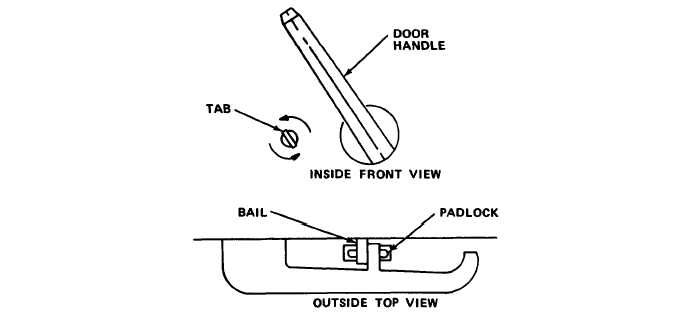TM 5-6675-319-14
When section heaters are not operating or when the section is being trans-
ported, liquid consumable supplies may freeze, break their containers, then melt,
and ruin equipment or documents.
Store these items in an area to prevent equipment
and document damage.
The operation of the internal equipment is per-
formed within environmentally controlled conditions; however, during transportation
or when air conditioning units are not operating, consumable supplies may suffer
reduced shelf life, and internal components may have accelerated deterioration of
g a s k e t s , s e a l s , o r i n s u l a t i o n.
1 - 7 . 4 O p e r a t i o n i n T r o p i c a l C o n d i t i o n s .
Fungi, mildew, or mold will form on and in
equipment, documents, and supplies if internal environmental control equipment is
not operating and outside heat and humidity are allowed to enter the section.
1-7.5 O p e r a t i o n i n D es ert Conditions.
O u s t , g r i t , a n d s a n d w i l l r u i n s u p p l i e s,
equipment, and documents.
Extreme care must be taken to prevent dust, grit, and
sand from entering the section.
A i r f i l t e r s w i l l b e c h a n g e d w h e n e v e r a i r f l o w i s
restricted, and cleaning of section interior must be conducted more frequently
than specified by PMCS schedules.
1-7.6 Emergency Procedures.
There are no specific emergency procedures for opera-
t i o n o f t h e s e c t i o n .
1-7.7 F m e r Q e nc v Means of E x i t .
In the event personnel are locked in the section,
the tab may be turned to the left until the bail on the padlock falls free. The
door handle is now free to turn.
1-7.8 Emergency E yewash.
If chemicals are accidently splashed into eyes, the
emergency eyewash station provides a means to flush chemicals from the eyes.
Immediate action is required to minimize injury.
Personnel must use the eyewash
station to wash their eyes thoroughly, then report for medical treatment .
1-48
1 - 7 . 3 O p e r a t i o n i n E x t r e m e H e a t.

